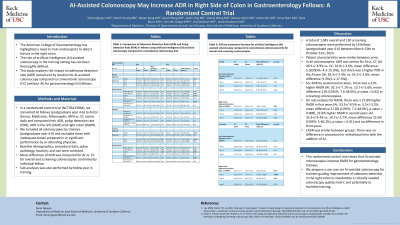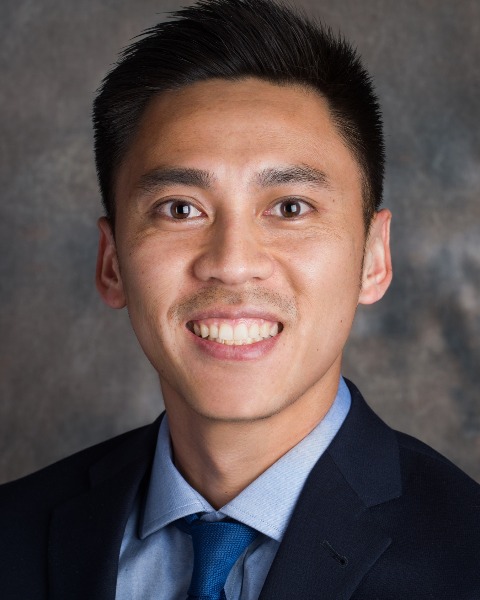Monday Poster Session
Category: Colon
P1931 - AI-Assisted Colonoscopy May Increase ADR in Right Side of Colon in Gastroenterology Fellows: A Randomized Control Trial
Monday, October 28, 2024
10:30 AM - 4:00 PM ET
Location: Exhibit Hall E


Denis Nguyen, MD
Keck School of Medicine of the University of Southern California
Los Angeles, CA
Presenting Author(s)
Award: Presidential Poster Award
Denis Nguyen, MD1, Patrick Chang, MD2, Niwen Kong, MD2, Sarah J. Wang, MD, MPH2, Nisha Sharma, MD2, Justin Ong, MD2, Daniel Wang, MD2, Maziar Amini, MD2, Aileen Bui, MD2, Omar Bakr, MD, MPH1, Dara Bruce, MSc3, Jennifer Dodge, MPH1, Ara Sahakian, MD1, James Buxbaum, MD1
1Keck School of Medicine of the University of Southern California, Los Angeles, CA; 2University of Southern California, Los Angeles, CA; 3Keck School of Medicine of the University of Southern California, Glendale, CA
Introduction: The American College of Gastroenterology has highlighted a need to train endoscopists to detect lesions in the right colon. The role of Artificial intelligence (AI) assisted colonoscopy in the training setting has not been thoroughly defined. This study explores the impact on adenoma detection rate (ADR) overall and by location for AI assisted colonoscopy compared to conventional colonoscopy (CC)(without AI) for gastroenterology (GI) fellows.
Methods: In a randomized control trial (NCT05423964), we consented GI fellows (postgraduate year 4-6) to AI (GI Genius, Medtronic; Minneapolis, MN) vs. CC rooms daily and compared their ADR, polyp detection rate (PDR), ADR in the left (LADR) and right colon (RADR). We included all colonoscopies by trainees (postgraduate year 4-6) and excluded those with inadequate bowel preparation or primary performance by an attending physician. Baseline demographics, procedural data, polyp pathology, location, and size were collected. Mean difference of ADR was compared for AI vs. CC for overall and screening colonoscopies controlled by fellow. Sub-analysis was performed by year.
Results: A total of 1,045 overall and 130 screening colonoscopies were performed by 16 fellows (postgraduate year 4-6) between March 15th to October 31st, 2023. Patient characteristics were similar between arms. In all colonoscopies, ADR was similar for AI vs. CC (AI: 40.5+/-3.9% vs. CC: 35.0+/-3.6%, mean difference: 5.5(CI95%:-4.3-15.3%)), but there was a higher PDR in the AI arm (AI: 63.3+/-3.4%, vs. 54.1+/-2.6%, mean difference: 9.3%(1.1-17.3%)). For ADR by anatomical location, there was a 21% higher RADR (AI: 35.1+/-7.1% vs. 13.7+/-5.6%, mean difference 21% (CI95%: 7.6-48.0%), p-value = 0.02). On sub-analysis for RADR, there was a 27.8% higher RADR in first years (AI: 33.3+/-9.5% vs. 5.5+/-3.2%, mean difference 27.8% (CI95%: 7.2-48.0%), p-value = 0.008), 22.6% higher RADR in second years (AI: 33.3+/-9.4% vs. 10.7+/-5.7%, mean difference 22.6% (CI95%: 5-40.2%), p-value = 0.01) and no difference in third years. LADR was similar between groups. There was no difference in procedural or withdrawal time with the addition of AI.
Discussion: This randomized control trial shows that AI assisted colonoscopies improve RADR for gastroenterology trainees. We propose a use case via AI assisted colonoscopy for trainees guiding improvement of adenoma detection in the right colon to standardize a critically needed colonoscopy quality metric and potentially to facilitate training.
Note: The table for this abstract can be viewed in the ePoster Gallery section of the ACG 2024 ePoster Site or in The American Journal of Gastroenterology's abstract supplement issue, both of which will be available starting October 27, 2024.
Disclosures:
Denis Nguyen, MD1, Patrick Chang, MD2, Niwen Kong, MD2, Sarah J. Wang, MD, MPH2, Nisha Sharma, MD2, Justin Ong, MD2, Daniel Wang, MD2, Maziar Amini, MD2, Aileen Bui, MD2, Omar Bakr, MD, MPH1, Dara Bruce, MSc3, Jennifer Dodge, MPH1, Ara Sahakian, MD1, James Buxbaum, MD1. P1931 - AI-Assisted Colonoscopy May Increase ADR in Right Side of Colon in Gastroenterology Fellows: A Randomized Control Trial, ACG 2024 Annual Scientific Meeting Abstracts. Philadelphia, PA: American College of Gastroenterology.
Denis Nguyen, MD1, Patrick Chang, MD2, Niwen Kong, MD2, Sarah J. Wang, MD, MPH2, Nisha Sharma, MD2, Justin Ong, MD2, Daniel Wang, MD2, Maziar Amini, MD2, Aileen Bui, MD2, Omar Bakr, MD, MPH1, Dara Bruce, MSc3, Jennifer Dodge, MPH1, Ara Sahakian, MD1, James Buxbaum, MD1
1Keck School of Medicine of the University of Southern California, Los Angeles, CA; 2University of Southern California, Los Angeles, CA; 3Keck School of Medicine of the University of Southern California, Glendale, CA
Introduction: The American College of Gastroenterology has highlighted a need to train endoscopists to detect lesions in the right colon. The role of Artificial intelligence (AI) assisted colonoscopy in the training setting has not been thoroughly defined. This study explores the impact on adenoma detection rate (ADR) overall and by location for AI assisted colonoscopy compared to conventional colonoscopy (CC)(without AI) for gastroenterology (GI) fellows.
Methods: In a randomized control trial (NCT05423964), we consented GI fellows (postgraduate year 4-6) to AI (GI Genius, Medtronic; Minneapolis, MN) vs. CC rooms daily and compared their ADR, polyp detection rate (PDR), ADR in the left (LADR) and right colon (RADR). We included all colonoscopies by trainees (postgraduate year 4-6) and excluded those with inadequate bowel preparation or primary performance by an attending physician. Baseline demographics, procedural data, polyp pathology, location, and size were collected. Mean difference of ADR was compared for AI vs. CC for overall and screening colonoscopies controlled by fellow. Sub-analysis was performed by year.
Results: A total of 1,045 overall and 130 screening colonoscopies were performed by 16 fellows (postgraduate year 4-6) between March 15th to October 31st, 2023. Patient characteristics were similar between arms. In all colonoscopies, ADR was similar for AI vs. CC (AI: 40.5+/-3.9% vs. CC: 35.0+/-3.6%, mean difference: 5.5(CI95%:-4.3-15.3%)), but there was a higher PDR in the AI arm (AI: 63.3+/-3.4%, vs. 54.1+/-2.6%, mean difference: 9.3%(1.1-17.3%)). For ADR by anatomical location, there was a 21% higher RADR (AI: 35.1+/-7.1% vs. 13.7+/-5.6%, mean difference 21% (CI95%: 7.6-48.0%), p-value = 0.02). On sub-analysis for RADR, there was a 27.8% higher RADR in first years (AI: 33.3+/-9.5% vs. 5.5+/-3.2%, mean difference 27.8% (CI95%: 7.2-48.0%), p-value = 0.008), 22.6% higher RADR in second years (AI: 33.3+/-9.4% vs. 10.7+/-5.7%, mean difference 22.6% (CI95%: 5-40.2%), p-value = 0.01) and no difference in third years. LADR was similar between groups. There was no difference in procedural or withdrawal time with the addition of AI.
Discussion: This randomized control trial shows that AI assisted colonoscopies improve RADR for gastroenterology trainees. We propose a use case via AI assisted colonoscopy for trainees guiding improvement of adenoma detection in the right colon to standardize a critically needed colonoscopy quality metric and potentially to facilitate training.
Note: The table for this abstract can be viewed in the ePoster Gallery section of the ACG 2024 ePoster Site or in The American Journal of Gastroenterology's abstract supplement issue, both of which will be available starting October 27, 2024.
Disclosures:
Denis Nguyen indicated no relevant financial relationships.
Patrick Chang indicated no relevant financial relationships.
Niwen Kong indicated no relevant financial relationships.
Sarah Wang indicated no relevant financial relationships.
Nisha Sharma indicated no relevant financial relationships.
Justin Ong indicated no relevant financial relationships.
Daniel Wang indicated no relevant financial relationships.
Maziar Amini indicated no relevant financial relationships.
Aileen Bui indicated no relevant financial relationships.
Omar Bakr indicated no relevant financial relationships.
Dara Bruce indicated no relevant financial relationships.
Jennifer Dodge indicated no relevant financial relationships.
Ara Sahakian indicated no relevant financial relationships.
James Buxbaum indicated no relevant financial relationships.
Denis Nguyen, MD1, Patrick Chang, MD2, Niwen Kong, MD2, Sarah J. Wang, MD, MPH2, Nisha Sharma, MD2, Justin Ong, MD2, Daniel Wang, MD2, Maziar Amini, MD2, Aileen Bui, MD2, Omar Bakr, MD, MPH1, Dara Bruce, MSc3, Jennifer Dodge, MPH1, Ara Sahakian, MD1, James Buxbaum, MD1. P1931 - AI-Assisted Colonoscopy May Increase ADR in Right Side of Colon in Gastroenterology Fellows: A Randomized Control Trial, ACG 2024 Annual Scientific Meeting Abstracts. Philadelphia, PA: American College of Gastroenterology.

